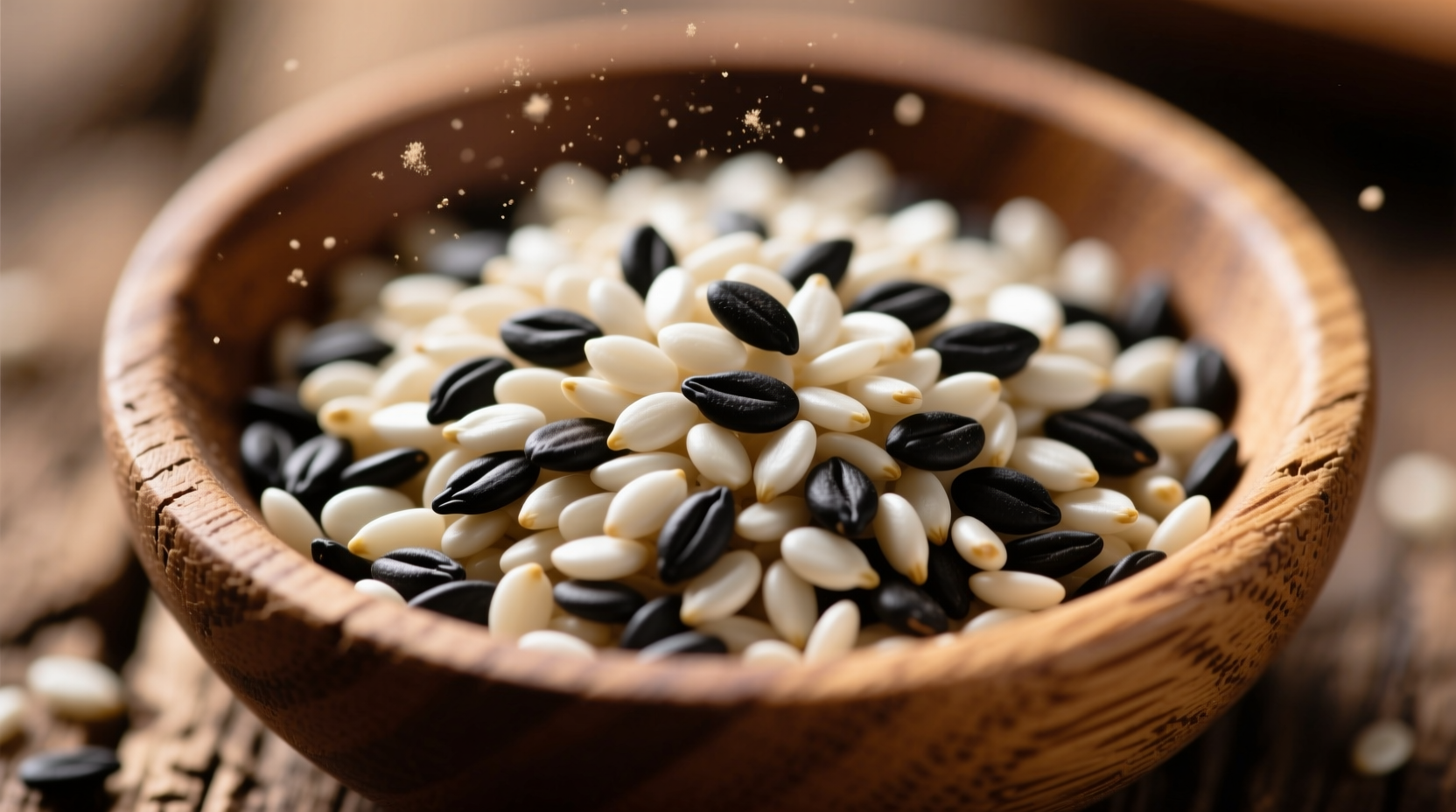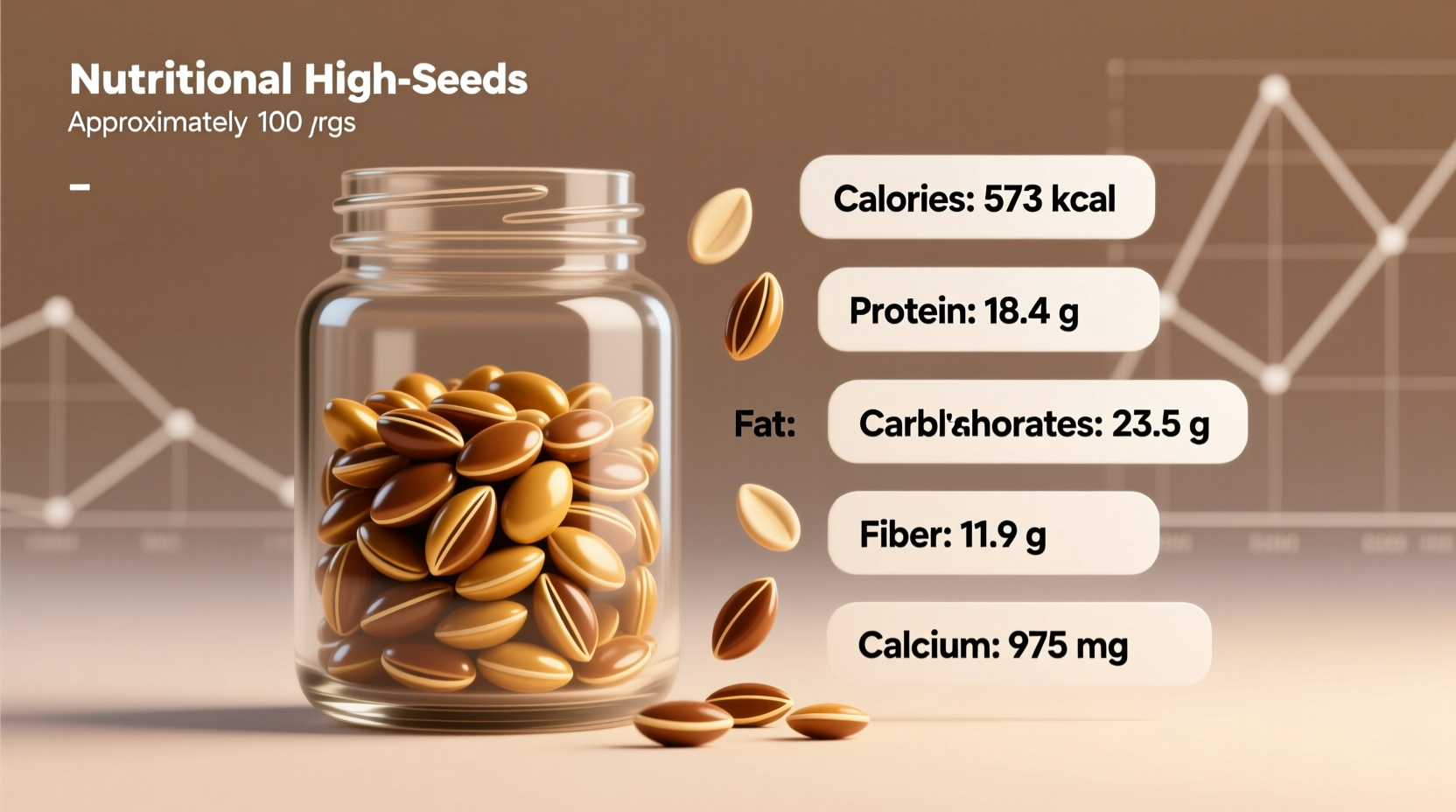Why Sesame Seeds' Calorie Count Matters for Your Nutrition Goals
Understanding the precise calorie content of sesame seeds helps you make informed dietary choices whether you're managing weight, building muscle, or simply maintaining a healthy lifestyle. Unlike many calorie sources, sesame seeds deliver substantial nutritional value per serving - providing healthy fats, protein, and essential minerals alongside their energy content.
Breaking Down Sesame Seeds' Nutritional Profile
While calories are important, sesame seeds offer much more than just energy. Let's examine what makes these tiny seeds nutritionally significant beyond their calorie count.
Macronutrient Composition per Tablespoon (9g)
| Nutrient | Amount | % Daily Value* |
|---|---|---|
| Calories | 52 | 3% |
| Total Fat | 4.6g | 6% |
| Protein | 1.6g | 3% |
| Carbohydrates | 2.1g | 1% |
| Dietary Fiber | 1.1g | 4% |
*Percent Daily Values based on a 2,000 calorie diet. Source: USDA FoodData Central

How Sesame Seeds Compare to Other Popular Seeds
When evaluating calorie density, it's helpful to compare sesame seeds with other commonly consumed seeds. The table below shows nutritional differences per one-ounce (28g) serving:
| Seed Type | Calories | Total Fat (g) | Protein (g) | Fiber (g) |
|---|---|---|---|---|
| Sesame Seeds | 160 | 14 | 5 | 3.3 |
| Chia Seeds | 138 | 8.7 | 5.2 | 9.8 |
| Flax Seeds | 150 | 12 | 5.2 | 7.6 |
| Pumpkin Seeds | 158 | 13 | 8.5 | 1.7 |
Understanding Calorie Density vs. Nutritional Value
Sesame seeds fall into the category of calorie-dense foods, but this doesn't mean they should be avoided. In fact, their high nutrient-to-calorie ratio makes them exceptionally valuable. According to research published in the Journal of Food Science and Technology, sesame seeds contain approximately 50-60% oil, primarily composed of healthy unsaturated fats that support heart health when consumed as part of a balanced diet.
Practical Serving Sizes for Different Goals
Knowing how much to use depends on your nutritional objectives:
- For general health maintenance: 1-2 tablespoons (9-18g) daily provides valuable nutrients without excessive calories
- For weight management: Stick to 1 tablespoon portions to enjoy benefits while monitoring calorie intake
- For athletes or active individuals: 2-3 tablespoons can support increased energy needs while providing essential minerals
Maximizing Nutritional Benefits While Managing Calories
How you incorporate sesame seeds affects both their flavor and nutritional impact:
Dry Toasting Technique
Lightly toasting sesame seeds enhances their nutty flavor while improving the bioavailability of certain nutrients. Place seeds in a dry skillet over medium heat for 2-3 minutes, stirring constantly until golden brown. This process doesn't significantly alter calorie content but makes the seeds more digestible.
Culinary Applications by Calorie Consideration
- Low-calorie boost: Sprinkle 1 tablespoon over salads or roasted vegetables (adds texture and nutrients with minimal calorie increase)
- Moderate-calorie addition: Incorporate 1-2 tablespoons into stir-fries or grain bowls (adds richness while maintaining balanced nutrition)
- Higher-calorie preparation: Use in tahini (sesame seed paste) where 2 tablespoons contain approximately 180 calories
Common Misconceptions About Sesame Seed Calories
Many people misunderstand how these small seeds fit into healthy eating patterns. Research from the Harvard T.H. Chan School of Public Health clarifies that while sesame seeds are calorie-dense, their nutrient profile makes them valuable for satiety and overall nutrition. The healthy fats in sesame seeds actually help with nutrient absorption from other foods, potentially improving the overall nutritional value of your meal.
When Calorie Counting Becomes Counterproductive
For most people, obsessing over the exact calorie count in sesame seeds misses the bigger nutritional picture. These seeds provide calcium, magnesium, iron, and zinc - minerals many diets lack. The 2020-2025 Dietary Guidelines for Americans emphasizes nutrient density over simple calorie counting, recognizing that foods like sesame seeds deliver exceptional nutritional value relative to their calorie content.
Practical Integration into Daily Meals
Here are three simple ways to incorporate sesame seeds without compromising your nutritional goals:
- Breakfast boost: Add 1 tablespoon to your morning oatmeal or yogurt (approximately 52 calories)
- Lunch enhancement: Sprinkle 1.5 tablespoons over salads or grain bowls (about 78 calories)
- Dinner accent: Use 1 tablespoon in stir-fries or as a garnish for roasted vegetables (52 calories)
Special Considerations for Different Dietary Needs
While sesame seeds benefit most people, certain dietary contexts require attention to portion sizes:
- Low-FODMAP diets: Sesame seeds are generally well-tolerated, with 1 tablespoon considered safe
- Keto diets: Their low carbohydrate content (1.1g net carbs per tablespoon) makes them keto-friendly
- Allergies: Sesame is now recognized as a major allergen; those with sensitivities should avoid completely
Final Thoughts on Sesame Seeds and Calorie Awareness
Understanding the calorie content of sesame seeds empowers you to make informed dietary choices without unnecessary restriction. These nutrient powerhouses deliver exceptional value per calorie when consumed in appropriate portions. Rather than focusing solely on calories, consider how sesame seeds contribute to your overall nutritional profile and culinary enjoyment.
Frequently Asked Questions
How many calories are in one tablespoon of sesame seeds?
One tablespoon (9 grams) of sesame seeds contains approximately 52 calories, with 4.6 grams of predominantly healthy unsaturated fats, 1.6 grams of protein, and 2.1 grams of carbohydrates including 1.1 grams of dietary fiber.
Are sesame seeds good for weight loss despite their calorie content?
Yes, sesame seeds can support weight management when consumed in appropriate portions (1-2 tablespoons daily). Their combination of healthy fats, protein, and fiber promotes satiety, helping you feel fuller longer. The nutrient density provides valuable minerals while contributing relatively few calories to your daily intake.
How do black sesame seeds compare nutritionally to white sesame seeds?
Black and white sesame seeds have nearly identical calorie content (approximately 52 calories per tablespoon), but black sesame seeds contain slightly higher levels of certain antioxidants and calcium. The primary difference is that white sesame seeds have had their outer hull removed, while black sesame seeds retain their hull, contributing to marginally higher fiber content.
Does toasting sesame seeds change their calorie content?
No, toasting sesame seeds doesn't significantly alter their calorie content. The process primarily affects flavor and texture while potentially improving nutrient bioavailability. One tablespoon of toasted sesame seeds still contains approximately 52 calories, though minimal moisture loss might concentrate nutrients slightly.











 浙公网安备
33010002000092号
浙公网安备
33010002000092号 浙B2-20120091-4
浙B2-20120091-4